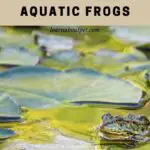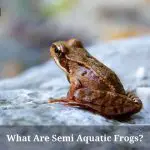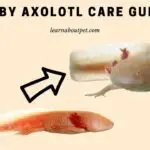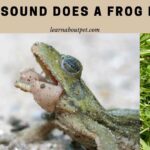Axolotls are fascinating creatures. They are considered very popular among pet owners, especially someone who likes to pet aquatic animals. However, due to their dragon-like structure, it can often make them look like a danger. Many people like to pet axolotls but do wonder if the Axolotls are dangerous or not together with other questions asking about their physical structure and their capabilities.
Are axolotls dangerous? Axolotls are not a danger or threat to humans. Axolotls cannot seriously hurt humans. Axolotls are small in proportion to humans and their overall behavior is also non-threatening to humans.
Due to their exotic body and appearance, Axolotls are considered to be one of the most unique pets that one can adopt. Even though they look like some fictional characters from a film, they are real. Axolotls get their popularity because of their dragon-like look.
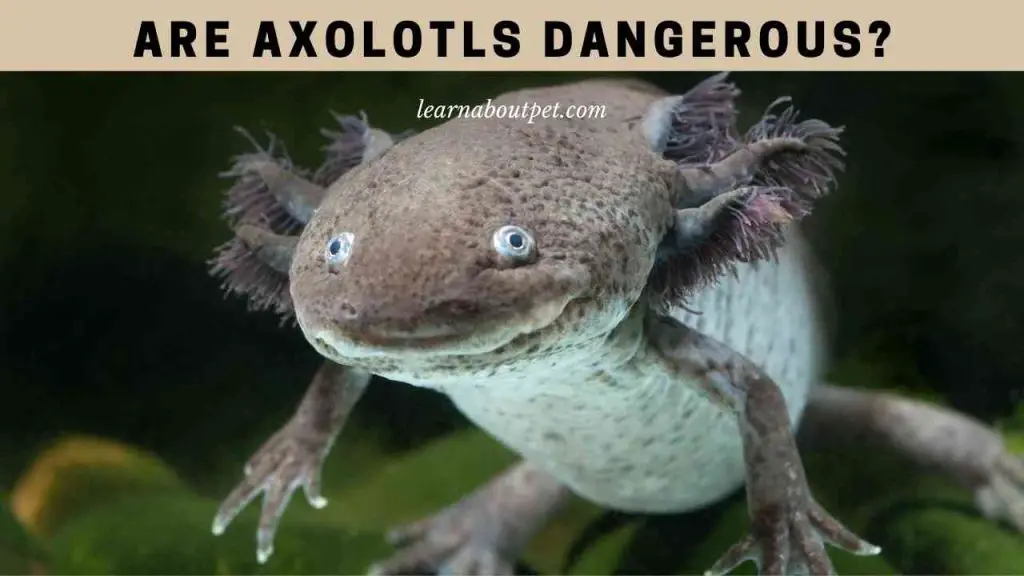
Another fact that makes them so unique is that they are amphibians. Often considered as fish, axolotls are amphibians but they don’t go through the metamorphosis like any other salamander species.
Even though Axolotls are not dangerous to humans, they can be a threat to fellow fishes. Axolotls don’t like to share their place so the Owners should keep that in mind when petting Axolotls and fishes together.
Are Axolotls Dangerous?
Due to their dragon and lizard-like structure, many people consider axolotls as dangerous however it is a myth. Axolotls are completely non-threatening salamanders and can’t hurt humans significantly.
However if talking about other fishes, the axolotls can be dangerous to other fishes and pets in the tank. Axolotls can harm and even eat other small pets in the tank. Axolotls take on violent behavior if they are forced to share space especially if the space is too small.
So to avoid the axolotls eating other fishes, owners should apply operators in the tank or keep axolotls and other pets in different tanks. So that the axolotls aren’t offended if a fish enters its territory.
Are Axolotls Poisonous?
Many times due to the appearance of axolotls many people ask are axolotls dangerous? No, Axolotls are not poisonous at all. Judging from their appearance, many people can believe the myth that the axolotls are poisonous but in reality, they are not. Axolotls don’t possess any poisonous or infections that can cause harm to humans.
Axolotls on the contrary are very safe if a human wants to interact with them. However, everyone should be very careful either when petting the axolotls or handling the axolotls as the axolotls are an endangered species so, to protect this species from getting extinct, they should be handled carefully.
Are Axolotls Smart?
All different animals are intelligent or smart in their different ways suiting their needs and requirements. Many studies are initiated on axolotls and they do find axolotls smarter than many other amphibians, reptiles, fishes, and other animals. Axolotls can recognize shapes and forms from distance and can remember even a human. Axolotls are found to be able to count to 3.
Axolotls have evolved in time to be opportunistic hunters. Axolotls sit in the same place for a long time without moving and wait for prey to swim by. In the wild, they were the apex predator of their habitat. Even though they don’t have advanced eyesight as humans do, they primarily use smell when locating their food.
Are Axolotls Always Smiling?
Axolotls are often considered to be smiling all the time but that isn’t the truth. The face of axolotls is biologically the way it looks like they are smiling. However, this can’t be true all the time that the axolotls are smiling. A smiling face on Axolotls occurs generally when they are eating something, they open their mouth to suck the food inside their mouths wide.
When the axolotls keep their mouths open when eating, it appears that they are smiling but in reality, they are eating. Some species of axolotls also have an upturned mouth shape naturally, which makes them look like they are smiling all the time. Many people confuse it with smiling but in truth, it is their natural appearance and doesn’t show their content.
Are Axolotls Aggressive?
No, axolotls are not aggressive towards humans, most probably axolotls consider themselves to be vulnerable in front of humans and they don’t possess any danger towards humans. However, axolotls can be a threat to their fellow fishes in the aquarium. Axolotls can harm and eat small fish present in the tank.
It is preferred to keep the small fishes or other small pets owners may have in separate tanks. However, it should be noted that axolotls are not the only culprit. Sometimes other fishes also attack axolotls. As axolotls are very vulnerable, their legs and gills can be damaged easily by fish.
Are Axolotls Dangerous To Humans?
Are axolotls dangerous to humans? No, axolotls are not dangerous to humans. As the myths revolve, neither are axolotls poisonous nor can they hurt humans. Axolotls like to keep themselves busy with themselves and other axolotls. However, axolotls owners should keep in mind to provide a proper setting to their pets.
Providing a good space is a necessity. Putting 20-25 gallons of water tank for one axolotl is required so the owner should buy the required things accordingly. Other things like air and water filters, proper artificial or original plants to create as much natural environment as possible. If failing to provide these requirements, frustration and stress can be seen among the axolotls.
Are Axolotls Dangerous To Pets?
Are axolotls dangerous to pets? Axolotls are vulnerable and possess risk from humans and other aggressive fishes rather axolotls are dangerous to humans or other pets. However, that doesn’t mean that they are innocent. Axolotls can also give their owners a harmless bite and to other fishes as well.
Even though axolotls bite humans, their teeth are not sharp enough to cut through human skin and you will not feel anything much more than a rough surface. Axolotls can not seriously harm humans but still, there are risks involved while petting the axolotls. Axolotls bite their owners not to harm them but they sometimes misunderstand human hands to food.

Are Axolotls Dangerous To Kids?
Are axolotls dangerous to kids? On a whole, it is safe for the kids and a family to have axolotls as a pet if axolotls are kept with good care and dealt with good hygiene. However, that does not conclude that axolotls are completely safe. Axolotls don’t bite generally to harm humans and keep in mind that children shouldn’t touch or come in contact with axolotls.
Picking and touching axolotls can cause stress among these exotic pets. Especially children should not hold axolotls as children holding axolotls have the risk to throw axolotls and children also possess the risk that they will get salmonella.
The only danger that kids have from axolotls is salmonella, which can be prevented if the owner takes strict measures of hygiene and washes his/her hands after handling the axolotls.
Does An Axolotl Bite?
Axolotls don’t bite in general however they can bite the other fishes in the tank. Axolotls also tend to eat small fishes that are kept in the tank with them. Axolotls are not dangerous to humans and their bites cannot affect humans.
Axolotls bite only because they want to show their territorial dominance, so if the owner keeps the axolotls in a small tank together with some small fishes, it can lead to a fight and even death. Axolotls require 20-25 gallons of water tank that don’t have fishes in it.
On the other hand, humans don’t have any fear from Axolotls, they can’t harm humans in any way. Axolotls do bite human fingers but do not intend to harm owners but they think that the fingers are also food.
What Happens If Axolotl Bites You?
Axolotls biting humans don’t cause any harm. Neither can it lead to any sort of infection. Axolotls biting humans is more like rubbing your finger onto a rough surface. Axolotls don’t bite out of aggression or animosity towards humans. It is just a misunderstanding that axolotls think that the human hand is their food. So overall axolotls bite cannot seriously harm humans.
The teeth of axolotls are very small and can’t break through the skin of humans. Axolotls are exotic and adorable salamanders, so they should be treated with utter care and hygiene. Special care should be given to their environment.
Do Axolotls Have Salmonella?
Many axolotls do carry salmonella, which is the biggest reason that makes axolotls unfavorable pets. While people with a strong immune system may just have some difficulty while facing salmonella, however, for people with a weak immune system the salmonella can be deadly.
Axolotls like many other reptiles and amphibians carry salmonella in their digestive tract and release this bacteria with their feces. To prevent getting this bacterial infection owners should practice good hygiene while handling the axolotls by washing their hands properly after holding axolotls.
How To Be Safe With Axolotls?
Axolotls carry salmonella in their gut and release it with their feces. Axolotl owners should handle axolotls with hygienic practice. The tank of axolotls shouldn’t be kept near where children stay most of the time. Axolotls should also be kept away from places where the family stays most of the time and eats food etc.
Another prevention required is that after handling the axolotls, owners should clean their hands carefully as it can also lead to bacterial infection. Overall axolotls shouldn’t be carried much and it should be avoided as much as the owners can.
Final Verdict – Are Axolotls Dangerous
Being one of the exotic pets, it’s surely a challenge to pet axolotls. Axolotls are calm and don’t require a lot of observation and care. Axolotls are safe to have pets. Neither do axolotls harm humans in any way. However, an axolotl can harm the small fishes living together with the axolotls. Axolotls can also eat small fish.
Axolotls are not aggressive pets but they follow this behavior to create space dominance among the fellow tank members. Space dominance can be seen in many animals and axolotls are no different.
Axolotls don’t possess any danger to humans. As the myth goes, whether axolotls are dangerous or poisonous are not true. On the contrary, axolotls amass risk from humans. For example, a human may hold an axolotl too tightly which may take away its life. So to conclude axolotls don’t possess any harm to humans.
When petting axolotls, owners should keep in mind the fact that axolotls carry salmonella in their gut which can harm humans. So it is advised to take proper precautions when cleaning axolotl feces.

Axolotls are also often considered to bite their owners, which is often considered as aggressive behavior, however that is not true. Axolotls don’t show animosity towards humans. Axolotls are very calm animals. However, axolotls do bite human fingers but that is just that axolotls consider human fingers as food.
The biting of axolotls isn’t harmful at all as axolotls don’t have strong enough teeth to go through the human skin and it otherwise also isn’t harmful at all. However just to be sure owners should always wash their hands after touching their axolotls.
As a pet lover, make sure to learn about pet more and give your pet hermit crab a good and comfortable life!

Welcome to Learn About Pet. My name is Rajkumar Ravichandran and I love all pets, travel, and amazing food. I write about my passion and personal experience caring for multiple pets in this blog! ❤️
Post Disclaimer
DISCLAIMER: THIS BLOG OR WEBSITE, "Learn About Pet", DOES NOT PROVIDE YOU WITH MEDICAL ADVICE AND IS NOT A SUBSTITUTE FOR MEDICAL ADVICE. ALWAYS GET IN TOUCH WITH YOUR PERSONAL VETERINARIAN AND USE INFORMATION HERE AS GENERAL ADVICE.
The information, including but not limited to, text, graphics, images and other material contained on this website are for informational purposes only. No material on this site is intended to be a substitute for professional veterinary advice, food recommendation, diagnosis, or treatment. Always seek the advice of your veterinarian or other qualified health care provider with any questions you may have regarding a medical condition or for pet food related questions.
